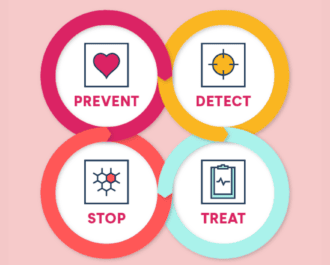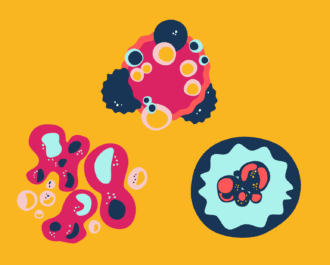
Following surgery, endocrine therapy is usually recommended for most women with hormone-receptor positive (HR+) breast cancer. However, after the endocrine therapy is complete, a decision needs to be made on whether follow-up chemotherapy is required. A course of chemotherapy can provide further reduction in risk of recurrence and death, but not all patients will benefit.
The choice to use additional chemotherapy is based on a number of risk factors. These risks can be assessed using clinical tests such as the Oncotype DX Recurrence score. However, the high cost of these tests (~$5000) and the current lack of Medicare subsidy means the tests are not accessible to all women.
An NBCF-funded study has now shown that an alternate and affordable tool, the IHC4+C score, can be used to provide prognostic information for women considering chemotherapy. The tool estimates the risk of recurrence at 10 years in postmenopausal women with HR+ breast cancer, who have received 5 years of endocrine therapy. The pilot study, led by medical oncologist Dr Belinda Yeo from the Olivia Newton-John Cancer Research Institute, recently validated the tool at a Breast Cancer Unit at Austin Health in Melbourne.
The study included 53 patients with HR+ breast cancer. Following surgery to remove their tumour, clinicians made an initial recommendation on whether they thought chemotherapy was warranted. Then, the data from the IHC4+C score was provided to the clinicians and patients, and researchers evaluated whether this additional information changed the decision on whether to pursue chemotherapy.
A total of 34 patients (64%) were initially recommended to undergo chemotherapy. Following the availability of the IHC4+C score, only 17 patients (32%) proceeded, revealing a substantial reduction in the proportion of patients undergoing chemotherapy.

NBCF-funded researcher Dr Belinda Yeo
Dr Yeo said the cost-effectiveness of this tool means that it could be used more widely. “Overall, this pilot study shows that when the IHC4+C score is used in a multidisciplinary setting, it is an alternative and affordable tool to identify those patients who will benefit from chemotherapy,” she explained. “This can spare a large proportion of patients from undergoing chemotherapy.”
The study’s findings provide a foundation to further explore and introduce the use of IHC4+C score in a larger study involving breast cancer units across Australia, allowing for more personalised treatment recommendations for patients with HR+ breast cancer.
NBCF is proud to provide the funding for this pilot study.
More News Articles
View all News


